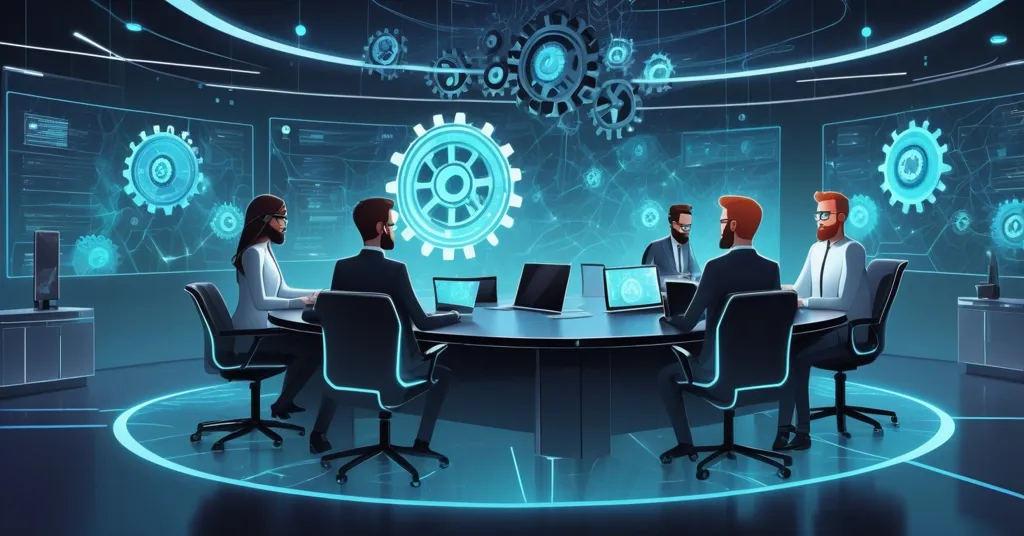AI Ethics at German Innovation Days: Shaping Blockchain and Crypto’s Future

AI Experts at German Innovation Days Push Human-Centered Systems: Implications for Blockchain and Crypto
At a recent high-profile event in Seoul, hosted by the German Embassy during the German Innovation Days, artificial intelligence (AI) experts delivered a powerful message: technology must prioritize human values over unchecked innovation. With Germany and South Korea as focal points, the dialogue revealed stark contrasts in AI strategies and a pressing need for global collaboration—a conversation that reverberates directly into the world of blockchain, cryptocurrency, and decentralized systems.
- Human-First AI: Experts demand AI development rooted in human dignity and democratic accountability.
- Contrasting Approaches: Germany focuses on risks like misinformation, while Korea chases economic gains.
- Crypto Connection: AI ethics directly impact blockchain privacy, DeFi, and decentralized innovation.
The event featured heavyweights like German Ambassador to Korea Georg Schmidt and AI ethics expert Kingra Schumacher, who championed a vision of AI that serves humanity rather than enslaves it. For the uninitiated, human-centered AI means designing systems with people at the core—think of it like a car equipped with airbags and brakes, not just built to race at breakneck speed. It’s about fairness, transparency, and ensuring tech doesn’t trample over societal good in the name of progress. This principle, both speakers argued, isn’t just a nice-to-have; it’s a must-have in a world where AI is increasingly intertwined with everything from finance to personal privacy. For deeper insights into this perspective, explore this discussion on AI experts urging human-centered systems globally.
Germany vs. Korea: A Clash of AI Philosophies
Germany and South Korea stand as fascinating case studies in how nations approach AI. Germany, with its industrial might, obsesses over the risks. They’re worried about:
- Misinformation campaigns powered by AI, flooding social media with lies.
- Deepfakes—fake videos or audio so realistic they can ruin reputations or sway elections.
- The impact on child development as kids grow up interacting with AI systems that may not prioritize their well-being.
Their expertise shines in industrial applications. Think robotics on factory floors, smart manufacturing processes at companies like Bosch, and precision engineering that keeps their economy humming. It’s not sexy, but it’s critical. Ambassador Schmidt didn’t mince words, warning against treating AI as a cure-all without addressing its darker potential.
Korea, by contrast, is playing for speed and profit. Boasting digital infrastructure that’s the envy of the world and massive data reserves, they’re focused on consumer-facing AI—virtual assistants like Samsung’s Bixby, personalized apps, and other tools that slip effortlessly into daily life. Their tech-savvy population and rapid adoption rates make this a natural fit. But as Schumacher noted, this breakneck pace can gloss over ethical pitfalls, a blind spot that could be disastrous without a counterbalance like Germany’s risk-averse mindset.
“Putting those two together, everybody could benefit.” – Kingra Schumacher
Schumacher’s point cuts deep. Picture Germany’s cautious, ethics-first framework fused with Korea’s data-driven, high-speed innovation. It’s not just a partnership for these two nations; it’s a model for how global cooperation can steer AI away from chaos. Both speakers emphasized that no country can tackle AI’s challenges in isolation, especially amid tensions like the US-China tech war or supply chain disruptions from conflicts like Russia-Ukraine, as Schmidt pointed out. The stakes couldn’t be higher, and frameworks like the OECD AI Principles—backed by over 40 countries—become essential. These guidelines push for fairness, transparency, and human oversight, ensuring AI doesn’t morph into a tool for exploitation or control. Think of them as guardrails for app developers or data privacy rules that keep tech accountable.
AI Literacy: Arming Society Against Overhype
A recurring drumbeat at the event was the need for AI literacy. If that sounds vague, it’s simply about teaching people what AI can and cannot do—a skill both experts insisted belongs in school curriculums. This isn’t about coding; it’s about not getting duped. Imagine learning to spot an AI-generated fake news story or understanding why a chatbot’s advice might be biased. Overreliance on AI, as Schmidt cautioned, can lead to catastrophic assumptions, like trusting a flawed algorithm to make life-or-death calls without a second thought.
“We should learn in schools that this is what AI can do, this is what it cannot do.” – Georg Schmidt
Schumacher doubled down, stressing preparation as the ultimate defense. When people grasp AI’s inner workings, they shield themselves from its pitfalls—whether that’s identifying a deepfake scam or challenging biased outputs. More than personal safety, it’s about readying society to weave AI into life without losing the plot.
“Basically, understanding means you can prepare yourself; you can prepare society.” – Kingra Schumacher
AI and Blockchain: Synergy or Time Bomb?
Now, let’s unpack why this matters to those of us in the Bitcoin and decentralization camp. AI and blockchain aren’t distant cousins; they’re increasingly entangled. Smart contracts on Ethereum could be optimized by AI for efficiency, decentralized identity systems might lean on machine learning for verification, and DeFi platforms are already dabbling in AI-driven trading bots. The promise is massive—think faster transactions, smarter oracles like Chainlink integrating real-world data, or even AI enhancing blockchain scalability by optimizing consensus mechanisms for energy efficiency.
But let’s not kid ourselves—AI without ethics is a ticking time bomb, especially when it’s tangled up with decentralized systems holding billions in value. Imagine an AI bot in DeFi lending that’s biased against certain demographics due to flawed training data, locking entire communities out of financial access. Or consider deepfake scams targeting crypto users, impersonating wallet providers to steal private keys. These aren’t hypotheticals; they’re looming threats. Without human-centered AI, the very tools meant to empower us through decentralization could become new vectors for centralized harm.
Geopolitical tensions add another layer of mess. The US-China tech race and conflicts like Russia-Ukraine disrupt supply chains for hardware critical to AI data centers and crypto mining rigs. Decentralization offers resilience—Bitcoin doesn’t care about borders—but if AI systems driving blockchain innovations are skewed by national interests or corporate greed, we’re back to square one. Human-centered AI isn’t a sidebar; it’s foundational to keeping decentralized tech a bastion of freedom, not a shiny new leash.
Collaboration or Competition: Can Nations Really Unite?
Germany and Korea’s potential partnership offers a glimmer of hope. Picture a joint AI-blockchain protocol they develop together—a system for secure, transparent voting on a decentralized ledger, powered by AI that’s been rigorously vetted for fairness. Germany’s ethical rigor could ensure the system doesn’t manipulate voter data, while Korea’s data prowess could make it scalable for millions. It’s a tangible outcome that shows what collaboration can achieve.
Yet, let’s play devil’s advocate for a moment. Is global collaboration realistic when nations are locked in fierce competition for tech dominance? In the crypto space, we’ve seen how decentralization often clashes with regulation—governments want control, not freedom. Why should AI be any different? National interests could easily trump shared values, turning “collaboration” into a buzzword while countries hoard their best tech for strategic gain. Still, the counterpoint holds: without at least attempting to align on principles like the OECD’s, we risk a fragmented AI landscape where the powerful dictate the rules, and the rest—much like in traditional finance—get screwed. Collaboration isn’t just worth pursuing; it’s our only shot at balance.
Key Questions and Insights on AI, Blockchain, and Crypto
Here’s a breakdown of the critical points and lingering questions around AI’s role in tech and decentralized systems, with clear takeaways to ground the discussion:
- What is Human-Centered AI, and How Does It Impact Blockchain Technology?
Human-centered AI prioritizes human dignity and societal values in tech design, ensuring fairness and transparency. For blockchain, it’s vital to prevent biased algorithms in DeFi or privacy breaches in AI-driven crypto tools, preserving the ethos of decentralization. - How Do Germany and Korea’s AI Strategies Differ, and What Can They Offer Crypto?
Germany focuses on risks and industrial AI like robotics, while Korea emphasizes economic gains through consumer tech. Their combined strengths could forge ethical, scalable AI-blockchain solutions—think secure DeFi protocols or privacy-first wallets. - Why Is Global Collaboration Essential for AI and Decentralized Systems?
No single nation can address AI’s challenges alone. Merging diverse strengths ensures systems benefit everyone, not just a few, safeguarding blockchain’s promise of financial freedom against AI-driven exploitation. - What Role Does AI Literacy Play in the Crypto Community?
It’s about understanding AI’s limits to avoid blind trust in tools like trading bots or wallet security systems. Educating users—starting early—builds a crypto community resilient to AI scams and biases. - How Do Frameworks Like the OECD AI Principles Support Ethical Blockchain Innovation?
These global standards push fairness and human oversight, ensuring AI integrated with blockchain—such as in smart contracts or data oracles—doesn’t become a tool for harm or centralized control.
Tying this back to our roots in Bitcoin and decentralization, the AI debate echoes our own fight for privacy, freedom, and smashing outdated systems. Just as we herald Bitcoin’s power to disrupt centralized finance, we must demand that AI—often a partner in this revolution—doesn’t morph into another overlord. If we’re serious about effective accelerationism and driving tech forward, it has to be with both eyes open, ensuring humanity stays in the driver’s seat. No fluff, no blind hype—just a ruthless commitment to building systems that liberate, not bind. As we push for decentralized futures, how do we ensure AI doesn’t sneakily centralize control in new, insidious ways?



